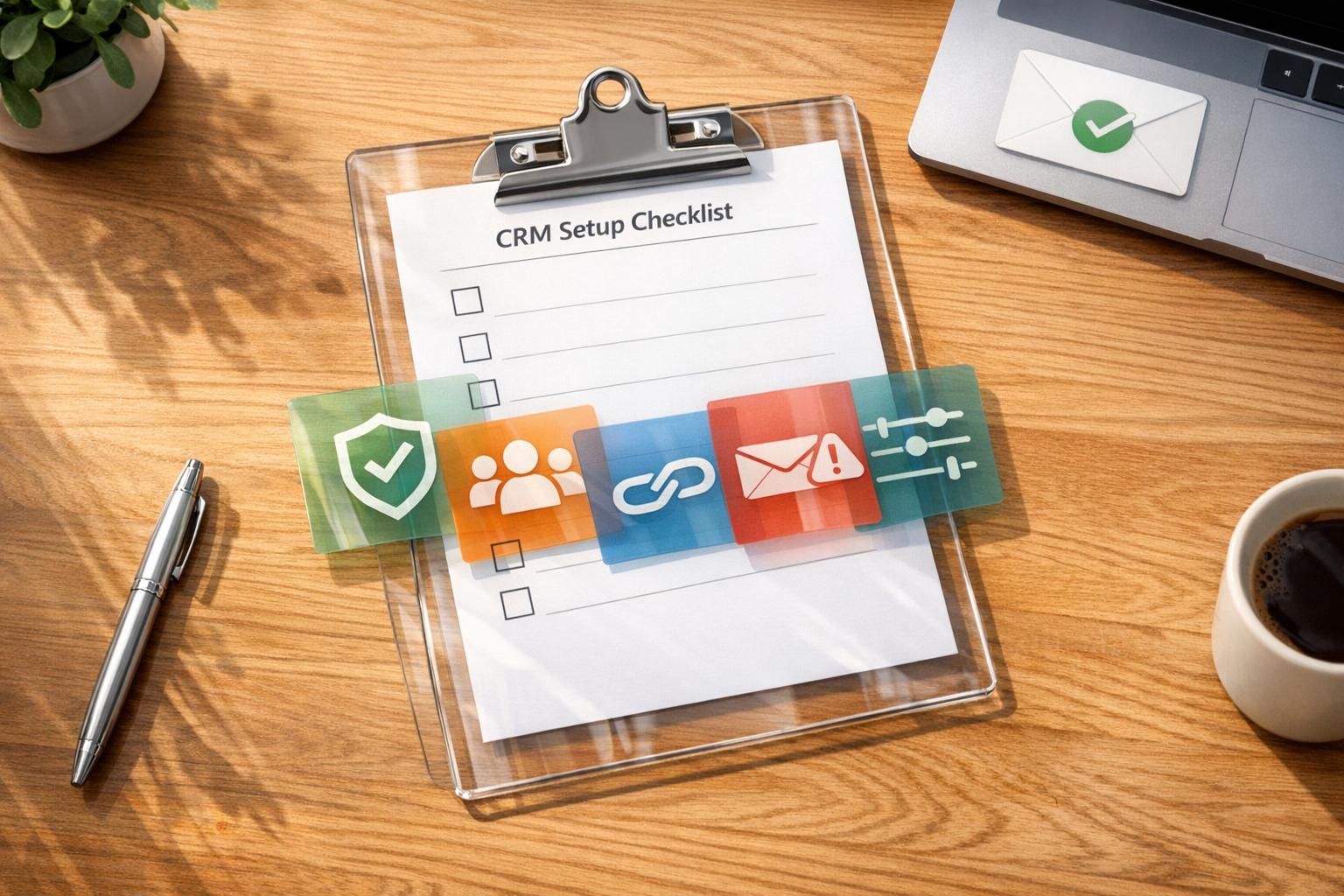5 AI Tools for Predictive Lead Scoring in 2025
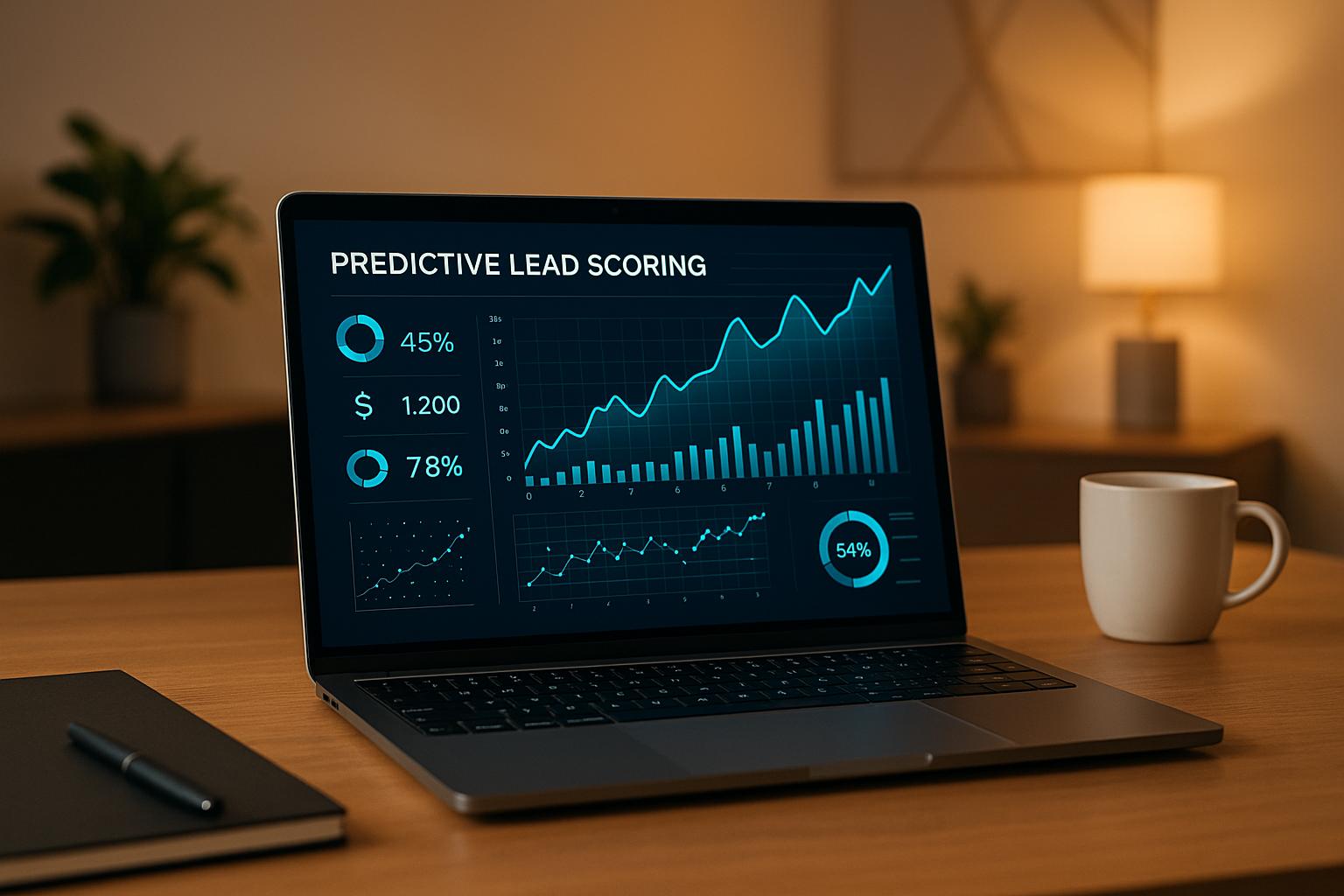
Predictive lead scoring has transformed sales by using AI to rank leads based on their likelihood to convert. By 2025, businesses are leveraging tools that analyze behavioral, demographic, and engagement data to prioritize prospects and improve efficiency. Here’s a quick look at five standout AI tools:
- ProPair.ai: Uses machine learning for accurate predictions, real-time analytics, and CRM integration.
- HubSpot Predictive Lead Scoring: Combines AI and manual inputs to generate "Likelihood to Close" scores, integrated with HubSpot's ecosystem.
- Persana AI: Focuses on automated lead scoring and enrichment, though detailed insights are limited.
- Breadcrumbs: A no-code platform offering real-time scoring updates and multi-source data integration.
- Salesforce Einstein: Built into Salesforce, it delivers advanced predictions and dynamic scoring models.
Quick Comparison
| Tool | Key Features | Best For | Pricing Model |
|---|---|---|---|
| ProPair.ai | Real-time analytics, adaptive scoring | Teams needing precise predictions | Volume-based with discounts |
| HubSpot | "Likelihood to Close" scores | HubSpot users | Included in Professional/Enterprise plans |
| Persana AI | Automated scoring, enrichment | Simpler lead qualification | User-based subscription |
| Breadcrumbs | No-code, real-time scoring | Teams needing flexibility | Custom pricing |
| Salesforce Einstein | Enterprise-grade predictions | Salesforce users | Enterprise pricing |
These tools help businesses reduce sales cycles, improve conversion rates, and prioritize high-quality leads. Choose based on your CRM, team size, and budget.
Using AI for predictive leads scoring in Clay.com
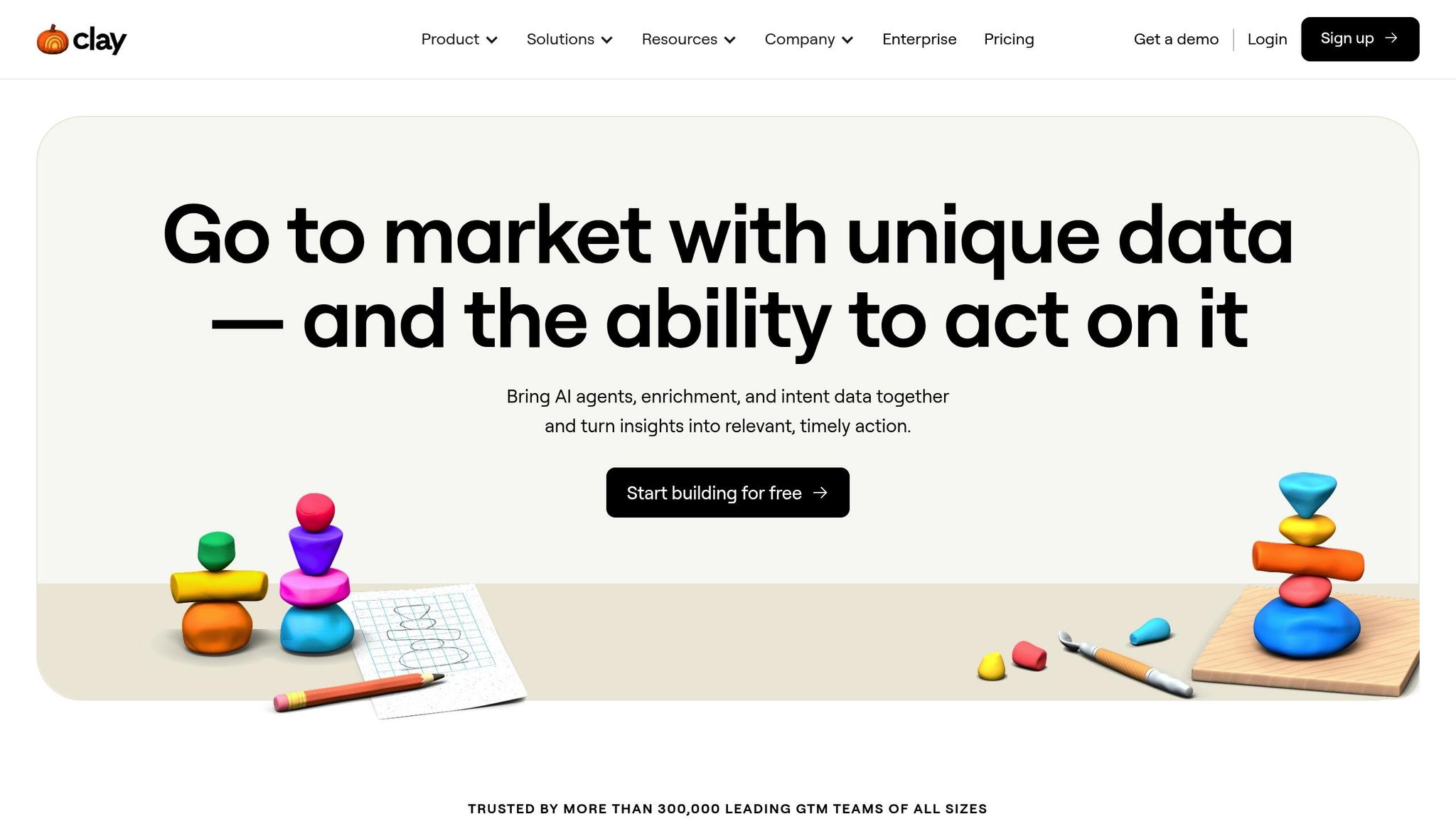
1. ProPair.ai

ProPair.ai is an AI-driven platform built to predict which leads are most likely to convert, replacing guesswork and outdated workflows with data-backed precision. Its focus is on refining resource allocation through accurate predictions.
Let’s dive into how ProPair.ai uses machine learning to redefine lead scoring.
Precision Through Advanced Predictive Modeling
At the heart of ProPair.ai is its powerful machine learning technology, which sifts through extensive historical sales data to generate highly accurate predictions. Its RANK system evaluates leads in real-time, providing a clear picture of their value, while the MATCH feature assigns leads to the most suitable team members based on past performance. Together, these tools ensure leads are engaged by the right people at the right time, boosting efficiency and results.
"ProPair has fundamentally changed how we look at lead distribution. We look back at the days before ProPair and wonder why we used gut instinct and static workflows to make so many important decisions." - Dan Stevens, VP Mortgage Strategy, NBKC Bank
Seamless CRM and Marketing Platform Integration
One of ProPair.ai’s strengths is its ability to integrate effortlessly with existing CRM and marketing systems, enhancing processes without requiring a complete system overhaul.
Take BNC National Bank, for example. By incorporating ProPair’s match-and-rank software into Velocify, they’ve streamlined their lead assignment process. This integration has allowed the bank to go beyond simply analyzing lead sources, offering deeper insights into which leads hold the most promise.
Real-Time Analytics for Smarter Decisions
ProPair.ai continuously updates its predictive scoring in real-time, adapting to new data and shifting lead behaviors as they occur. This allows businesses to respond to market changes immediately, staying ahead of the curve.
Instead of relying on external data sources for enrichment, ProPair.ai focuses on maximizing the value of the data businesses already have. Its AI and machine learning tools analyze this internal information to produce actionable insights, directly improving lead conversion rates.
"As organizations mature, you need to make better use of your data. We now have ProPair and data in our corner to make smarter decisions with our resources and elevate our lead conversion results." - Kevin Smith, Senior Technology Manager, Ladera Lending
Adaptive Scoring Models That Evolve Over Time
ProPair.ai’s algorithms are designed to learn and adapt continuously, ensuring its scoring models improve as they process more data. This dynamic flexibility means businesses can stay aligned with changing market trends and internal goals.
For companies curious about the platform’s potential, ProPair offers the ProPair Challenge. This free 48-hour analysis uses machine learning to uncover opportunities for enhancing lead scoring, distribution, and conversion rates. It’s a risk-free way to see the platform’s impact in action before committing to full implementation.
2. HubSpot Predictive Lead Scoring

HubSpot's predictive lead scoring tool uses AI to identify and rank top prospects, making it easier for businesses to focus their efforts on high-priority leads. Integrated directly into HubSpot's marketing platform, this system goes beyond traditional scoring methods by applying advanced machine learning. It’s a key part of HubSpot’s broader analytics and integration capabilities.
How Predictive Modeling Works
HubSpot uses machine learning to analyze data from multiple sources - emails, website visits, forms, and social media interactions - to generate a "Likelihood to Close" score. This score estimates the probability of a lead converting within a specific period, typically 90 days. The real-time updates ensure sales teams always have the most current insights, unlike static scoring methods. The system also offers flexibility by combining AI-powered scoring with manual inputs, allowing businesses to incorporate both engagement data and key demographic or firmographic information.
Seamless Integration with CRMs and Marketing Tools
One of HubSpot's standout features is its ability to integrate effortlessly with various CRMs, marketing platforms, and third-party tools. This integration creates a centralized data hub, where information from every touchpoint is continuously updated and fed into the predictive models. As a result, scoring becomes more precise, and workflows are more efficient. Automated processes, such as follow-ups and notifications, ensure sales teams are alerted as soon as a lead reaches a high "Likelihood to Close" score, enabling timely action.
Real-Time Insights and Lead Enrichment
HubSpot’s real-time analytics dashboards provide instant updates on lead engagement, score changes, and conversion metrics. By enriching lead profiles with both behavioral and demographic data, the platform equips sales and marketing teams with actionable insights. For example, if a lead suddenly shows increased interest - like visiting a pricing page or downloading a key resource - the system flags this immediately, ensuring that no opportunity is missed.
Adapting to Change with Dynamic Scoring
HubSpot’s predictive lead scoring adapts continuously, updating scores based on the latest interactions and behaviors. Users can tweak scoring criteria and automate workflows to align with evolving buyer habits. A mid-sized B2B SaaS company, for instance, saw a 30% increase in sales-qualified leads within just three months of using the system. Additionally, the AI models account for market trends and seasonal shifts, ensuring the scoring remains relevant and effective without requiring constant manual adjustments.
3. Persana AI
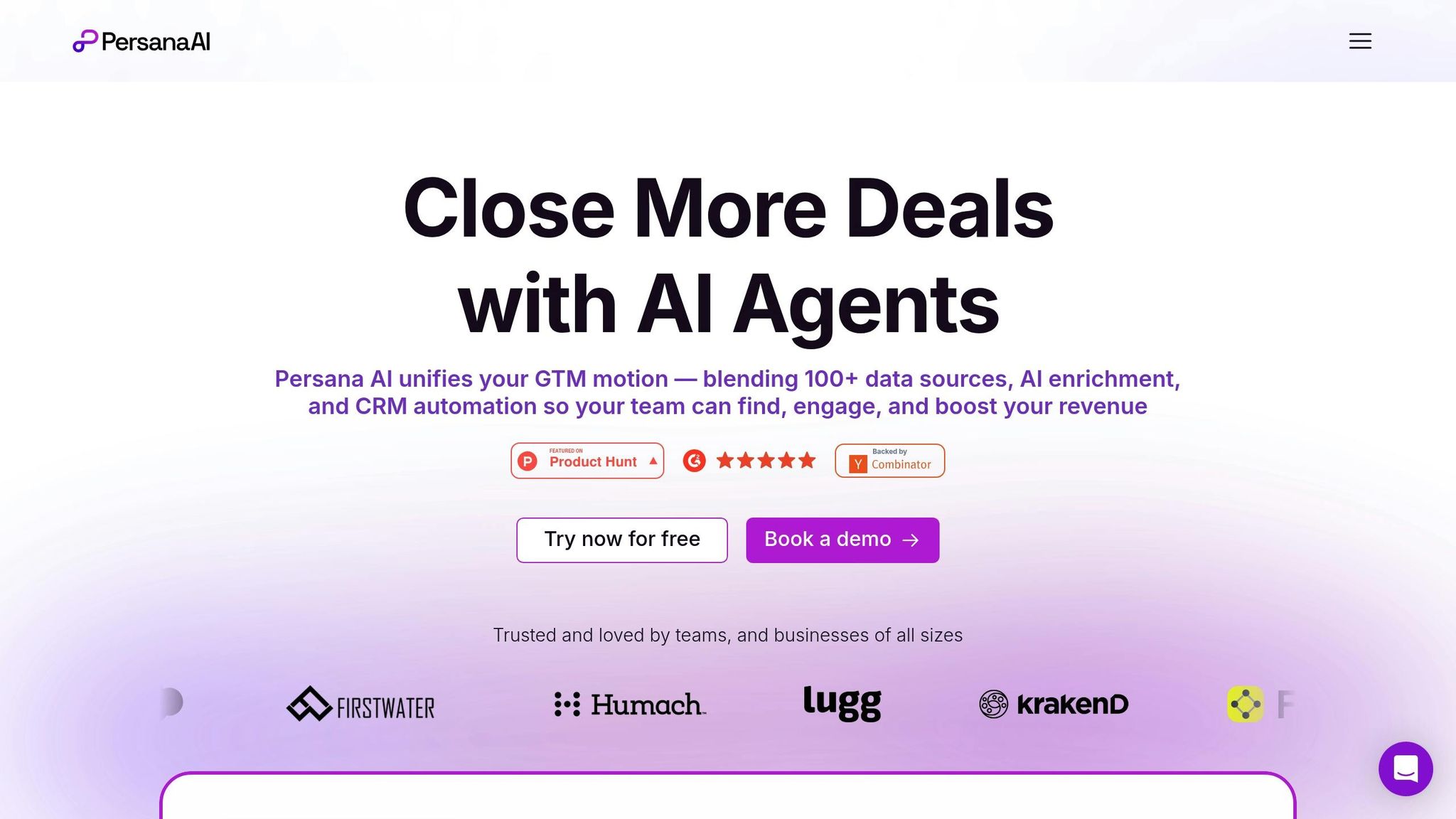
After exploring ProPair.ai and HubSpot, another contender in the AI lead scoring arena worth mentioning is Persana AI. This tool is designed to simplify B2B lead qualification through AI-driven processes. However, detailed insights into its technology, integrations, and features are limited.
Some descriptions suggest that Persana AI combines automated lead scoring with lead enrichment. Yet, specifics about its modeling techniques, real-time analytics, and dynamic updates remain unclear. For businesses considering this tool, it's essential to refer to official sources for a better understanding of its capabilities and how it connects with CRM systems. Compared to the earlier tools discussed, Persana AI's lack of detailed information highlights the importance of seeking clarity directly from the vendor.
For those curious about how Persana AI might enhance their predictive lead scoring strategies in 2025, keeping an eye on updates and vendor communications is a smart move. This will help businesses assess its potential value and compatibility with their existing marketing and CRM platforms.
sbb-itb-5f36581
4. Breadcrumbs
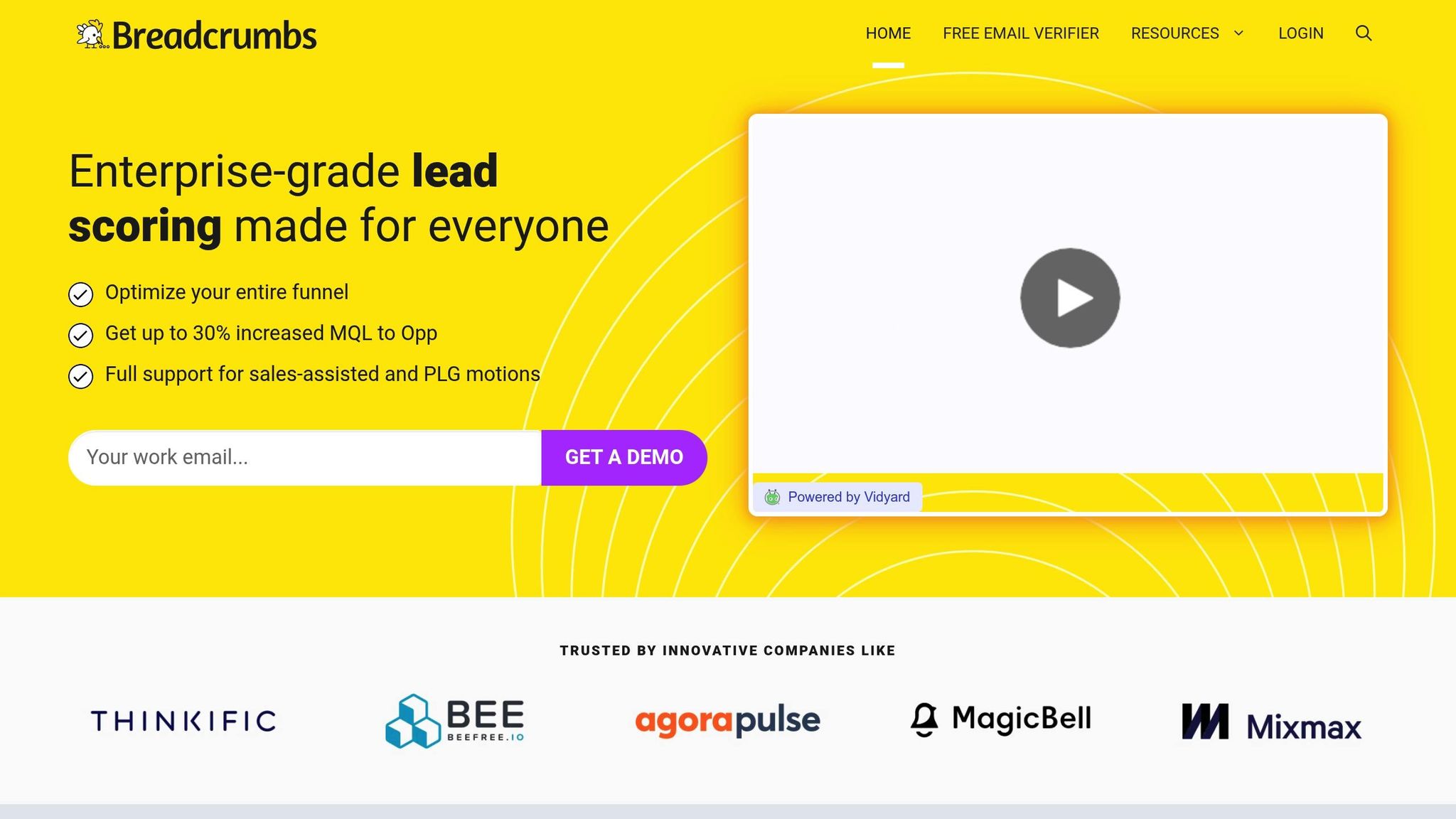
Breadcrumbs takes lead scoring to the next level by offering a no-code platform that simplifies the entire process. Its AI-driven scoring engine combines demographic, behavioral, and firmographic data to generate highly accurate lead scores. Unlike earlier platforms, Breadcrumbs stands out with its no-code customization options and strong API support, making it accessible for teams without technical backgrounds to build, test, and deploy scoring models.
Smarter Predictive Modeling
Using machine learning, Breadcrumbs continuously improves lead scores by analyzing real-time data and historical trends. It tracks activity across websites, emails, and CRM systems to generate adaptive scores. For instance, a mid-sized SaaS company that integrated Breadcrumbs with Salesforce and its marketing tools saw a 25% boost in lead conversion rates over six months. This dynamic scoring allowed the sales team to focus on high-potential leads while marketing fine-tuned their strategies based on enriched lead data.
Seamless CRM and Marketing Tool Integrations
Breadcrumbs integrates effortlessly with popular CRM platforms like Salesforce and HubSpot, as well as marketing automation tools. Its support for API connections also enables custom integrations, giving businesses the flexibility to tailor the platform to their needs. This smooth compatibility sets it apart from more traditional systems.
Real-time Insights and Lead Enrichment
The platform provides intuitive dashboards that showcase lead activity, score changes, and conversion probabilities. By pulling data from third-party sources and user interactions, Breadcrumbs enriches lead profiles, equipping sales teams with actionable, up-to-date insights. This helps prioritize leads that are most likely to convert.
Adaptive Scoring Models for Continuous Improvement
Breadcrumbs is built with flexibility in mind, supporting dynamic scoring models that automatically adjust as new data comes in or business priorities shift. Users can customize scoring rules, set triggers for score updates, and continuously refine their models. This real-time adaptability ensures the platform evolves alongside the business. Experts have praised Breadcrumbs for its transparent scoring logic, which helps teams understand and trust the system's lead prioritization.
For businesses aiming to improve the quality of their lead data, pairing Breadcrumbs with tools like Reform can deliver even better results. Reform’s advanced form-building features - such as multi-step forms, conditional routing, and lead enrichment - integrate seamlessly with CRM and marketing tools, ensuring accurate and actionable data collection.
5. Salesforce Einstein

Salesforce Einstein is an AI-driven suite built into the Salesforce platform, designed to provide advanced predictive lead scoring by analyzing an extensive range of data. From behavioral and demographic signals to engagement metrics, Einstein processes thousands of data points to deliver precise predictions. These insights help sales teams focus on high-value prospects, enabling better prioritization and decision-making.
Precision in Predictive Modeling
Einstein's predictive models are trained on massive datasets, uncovering patterns that traditional methods often overlook. Salesforce reports that Einstein's lead scoring can boost conversion rates by as much as 30% compared to manual approaches. For example, a mid-sized B2B software company saw its conversion rate rise from 15% to 28% in just six months. Their sales team noted they could target higher-quality leads and close deals more efficiently. Einstein's system also evaluates subtle interactions, such as repeated visits to key product pages, ensuring even less obvious buyer behaviors influence lead scores.
Seamless Integration with CRMs and Marketing Tools
Einstein integrates directly with Salesforce CRM, creating a unified data ecosystem across Salesforce Sales Cloud, Marketing Cloud, and Pardot. This integration eliminates data silos, allowing real-time updates from sources like emails, websites, and social media. For instance, if a lead downloads a whitepaper or visits a pricing page, Einstein immediately updates their score and notifies the sales team. This instant feedback reduces response times and increases the likelihood of timely conversions. Additionally, it enhances lead profiles by incorporating external data, such as company size and industry information.
Dynamic Scoring and Continuous Improvement
Einstein leverages machine learning to create dynamic scoring models that adapt to shifting customer behaviors and market trends. The platform continuously refines its scoring criteria, automatically retraining models based on new sales outcomes. It also supports manual adjustments and A/B testing, enabling businesses to fine-tune configurations for their specific needs. By combining automated updates with feedback from sales teams, Einstein ensures its predictions remain accurate and relevant. These capabilities make it a powerful tool for businesses aiming to stay ahead in the competitive landscape of predictive lead scoring.
Tool Comparison Chart
Here's a breakdown of five predictive lead scoring tools based on their accuracy, integrations, features, and pricing:
| Tool | Predictive Accuracy | Key Integrations | Standout Features | Pricing Model |
|---|---|---|---|---|
| ProPair.ai | High – Dynamic models that continuously adapt | Salesforce, HubSpot, and other major CRMs | Real-time analytics and adaptive scoring | Volume-based pricing with discounts |
| HubSpot Predictive Lead Scoring | High – Analyzes thousands of data points | Native HubSpot, Zapier, and API connections | "Likelihood to Close" scores with 90-day predictions | Tiered subscriptions (included in Professional/Enterprise) |
| Persana AI | Solid – Automated scoring and enrichment | CRMs and outreach platforms | Automated lead enrichment and personalized outreach | Free trial available; user-based subscription |
| Breadcrumbs | Strong – Multi-source data integration | CRMs, marketing automation tools, and data enrichment platforms | Real-time scoring updates | Custom pricing based on volume and features |
| Salesforce Einstein | High – Enterprise-grade AI predictions | Deep Salesforce integration and third-party apps | Predictive opportunity insights and AI recommendations | Enterprise pricing based on user count and data volume |
This table provides an overview, while the sections below dive deeper into each evaluation criterion.
Accuracy Performance
When it comes to predictive accuracy, ProPair.ai and Salesforce Einstein stand out. ProPair.ai’s dynamic models continuously adapt, ensuring high performance. Similarly, Salesforce Einstein delivers enterprise-grade AI predictions, making it a strong choice for complex sales environments. HubSpot, while slightly different, analyzes thousands of behavioral and demographic signals to predict conversion probabilities within a 90-day window, offering reliable insights for decision-making.
Integration Flexibility
Integration capabilities are another critical factor. HubSpot provides a seamless experience for businesses already using its ecosystem, thanks to native integrations and API support. For Salesforce users, Salesforce Einstein offers deep and intuitive integration, enhancing the overall CRM experience. Tools like ProPair.ai and Breadcrumbs cater to diverse tech stacks, supporting multiple CRMs and marketing platforms, which makes them more versatile for businesses using varied tools.
Feature Differentiation
Each tool has its own standout features. HubSpot emphasizes its "Likelihood to Close" scores, offering actionable insights into lead conversion potential. Persana AI is ideal for automating lead qualification and enriching data, making it a great fit for teams focusing on personalized outreach. Breadcrumbs shines with its real-time scoring updates, which can be particularly useful for fast-paced sales teams. Meanwhile, Salesforce Einstein goes a step further with predictive opportunity insights and AI-driven sales recommendations, providing end-to-end support for enterprise sales processes.
Cost Considerations
Pricing structures vary significantly depending on the tool and the size of your business. HubSpot includes predictive scoring in its higher-tier Professional and Enterprise plans, offering transparent tiered pricing. ProPair.ai adopts a volume-based pricing model, with discounts available for larger lead volumes, making it scalable for growing organizations. Salesforce Einstein typically requires an enterprise-level investment, but it delivers advanced AI capabilities across the sales process. Persana AI offers a user-based subscription model, with a free trial to help businesses evaluate its features. Breadcrumbs provides custom pricing tailored to your lead volume and feature requirements.
When choosing a tool, consider how well it aligns with your existing tech stack, business size, and budget. Each option offers distinct strengths, so the best choice will depend on your specific needs.
Conclusion
The right AI-powered predictive lead scoring tool can transform your sales efficiency in 2025. With the market expanding rapidly, embracing advanced technologies has become more important than ever. Your choice of tool should reflect both current market trends and the specific needs of your business.
When selecting a tool, consider how well it fits your company's size and structure. For instance, small to medium-sized businesses often thrive with scalable platforms like HubSpot, while larger enterprises tend to benefit from more sophisticated solutions like Salesforce Einstein, which can handle complex sales cycles.
Integration is another critical factor to evaluate. Look for tools that can seamlessly connect with your existing CRM and marketing automation systems. This ensures real-time data synchronization and eliminates the hassle of manual data transfers. After implementation, focus on tracking key metrics such as lead conversion rates, sales cycle duration, and cost per acquisition. These indicators help measure the tool's effectiveness. Interestingly, B2B companies now utilize lead scoring software 14 times more than they did in 2011, underscoring its growing importance in competitive sales environments.
To maximize results, select tools with features tailored to your industry and sales cycle - whether you need real-time scoring or deep predictive insights. Pairing your lead scoring tool with a strong lead capture solution like Reform (https://reform.app) can further enhance lead quality and drive better outcomes.
FAQs
How do AI tools for predictive lead scoring work with CRM systems?
AI tools for predictive lead scoring integrate seamlessly with CRM systems through APIs, webhooks, and custom mapping features. These connections enable effortless data sharing, automatic lead enrichment, and real-time updates, ensuring that lead scores remain up-to-date within the CRM.
For instance, some platforms simplify the process of connecting forms and automation tools to CRMs. This allows businesses to manage lead qualification more efficiently - no advanced technical expertise required. As a result, sales teams gain quick access to precise lead insights directly within their usual workflows, saving time and boosting overall productivity.
How does real-time lead scoring differ from traditional methods?
Real-time lead scoring taps into current data to evaluate and qualify leads instantly. This approach lets businesses act faster and focus on the most promising leads with greater accuracy.
On the other hand, traditional lead scoring depends on fixed criteria and occasional updates. This often results in slower responses and less precise assessments.
With real-time insights, businesses can quickly adjust to shifts in customer behavior, boosting their chances of converting leads. It's a more agile and effective method compared to older, static scoring systems.
What’s the best way for businesses to choose an AI tool for predictive lead scoring?
When choosing an AI tool for predictive lead scoring, it’s essential to zero in on a few critical features. Look for integration compatibility to ensure the tool works seamlessly with your existing software, customization options to tailor it to your unique needs, and lead enrichment capabilities to enhance the quality of your data.
Additionally, make sure the tool aligns with your specific business goals and can handle the intricacies of your lead qualification process. Tools that provide powerful analytics, real-time insights, and features like spam prevention can significantly boost lead quality and, ultimately, your conversion rates.
Related Blog Posts
Get new content delivered straight to your inbox

The Response
Updates on the Reform platform, insights on optimizing conversion rates, and tips to craft forms that convert.
Drive real results with form optimizations
Tested across hundreds of experiments, our strategies deliver a 215% lift in qualified leads for B2B and SaaS companies.


.webp)



